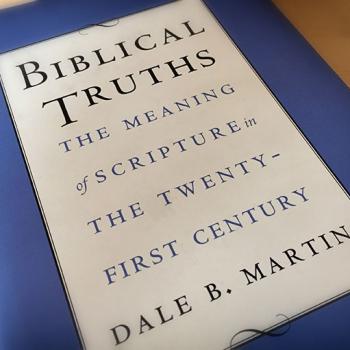This guest post was written by Darrell Lackey.

If you’ve spent any time in a fundamentalist or evangelical church, you’ve probably heard some variation of the following from the pastor or leaders: “I don’t preach my opinions, I just preach God’s word;” or, “I just want to know what the Bible says;” or, “I just believe what the Bible says;” or my favorite, “The Bible says it, I believe it, and that settles it.” You get the idea. And even if you haven’t heard these exact words, you’ve likely heard the similar sentiments. However, these assertions and the ideas they represent are entirely unhelpful and frankly ridiculous.
The primary idea informing the statements above is that we need to remove ourselves from our Bible reading. We need to stand outside the text, at a distance, so that we don’t taint our reading with our own personal subjective opinions and ideas. The Bible just means what it “says” or what is written. Simple. Just open it and read. What’s the problem? Wow–where to begin?
First, no one can step outside themselves and interpret any writing from a purely objective space. No such space exists. We are always persons in context. We exist in specific locations, whether culturally, geographically, philosophically, or theologically. We were and are shaped by a myriad of complex influences, many of which we are hardly even aware. We are the result of a long process of shaping and the influence of others. We are always “situated.” We bring all this to whatever it is we are reading (not just the Bible) and we interpret everything through the lens provided by that shaping. This isn’t to say that we are not our own persons, who make up our own minds, but it is to say we are still always doing this from some place, some context, some situated-ness.
If we are aware of this “being situated,” then we can read more cautiously and wisely because we are aware of our biases and prejudices. If we are not aware of our always being “situated,” however, it can mask those biases and prejudices. Therefore, many Christians read the Bible and what they “hear” only confirms (shocker!) what they already believe. This becomes a reinforcing echo chamber that confirms what we already thought (were taught) and prevents us from ever “hearing” anything in the Bible that would disrupt, deconstruct, or bring under judgment any prejudices or self-serving readings.
What this means is that no one is ever just going by “what the Bible says.” When someone tells us the Bible just “says what it says,” the natural rejoinder is: “But what does it say?” When someone tells us that a passage in the Bible just “means what it means” the natural rejoinder is “But what does it mean?” All those assertions (“I just go by what the Bible says”) are nonsense and question-begging. They are really meant to cut off discussion and prevent disagreement. They are often code for this sentiment: “You are no longer questioning my views or interpretations, you are really questioning God himself and what God has written.” How does one respond to that? Those types of statements come from a deep insecurity, fear, and the need to control others. They do not arise out of a real effort to humbly converse, to learn from, and engage another person in good faith.
Second, when we are reading, whether the Bible or any other text, we are always interpreting. There is no direct, one-to-one correspondence, between my reading and my assertion regarding what the text means, as if I had some inside line to the very mind of the writer. Unless the writer is literally and physically present to correct us or tell us exactly what they meant, we are always interpreting, which means there are layers to our reading. We are never just letting the Bible speak for itself–if that were the case there would be no need for sermons or teaching. The pastor or priest would simply stand, read the text, and sit down.
Let’s be clear about what is really happening when we hear the “I just go by what the Bible says” types of statements. What’s really being said is: “I just go by what I have been taught, by what others have thought or written about these passages, and all that is still further interpreted and understood through my own personal, cultural, educational, family, geographical, social background and history.”
Remember, the Bible doesn’t “say” anything until someone articulates what they think it is saying. The last time I checked, the Bible did not literally and audibly just start speaking in English to me as I read it. We are the readers. We must do the hard work of hermeneutics, of interpreting, which is both an art and science. Furthermore, we should always be aware that our interpretations could be wrong. We might completely miss what the author wanted us to hear or understand. Instead of claiming that we are speaking for God or just “going by what the Bible clearly teaches,” we need to be humble and admit that we are trying to interpret and understand as best we can–and that it is us who is speaking.
Why is this important? One need only look to the issue of slavery or the way women have been treated historically to point out how wrong the church has at times found itself when it comes to interpreting the Bible. Are there issues in our present day where the church could be making the same interpretive mistakes?
So, don’t be fooled when you hear pastors or church leaders claim, “We are just going by what the Bibles says” or that a passage “just means what it means–what it says.” Smile to yourself, and think: “Yeah, right, sure.” In the meantime, in private, you may want to respectfully challenge such thinking and ask those making such statements to reconsider how they talk about reading the Bible.
Image via Pixabay, edited by Dan Wilkinson.
 About Darrell Lackey
About Darrell Lackey
Darrell Lackey has been a lead pastor and currently manages a small law firm. He is active in his current church as a teacher and plays guitar with the worship team. He is a graduate of the University of San Francisco and Golden Gate Baptist Theological Seminary (now Gateway).












